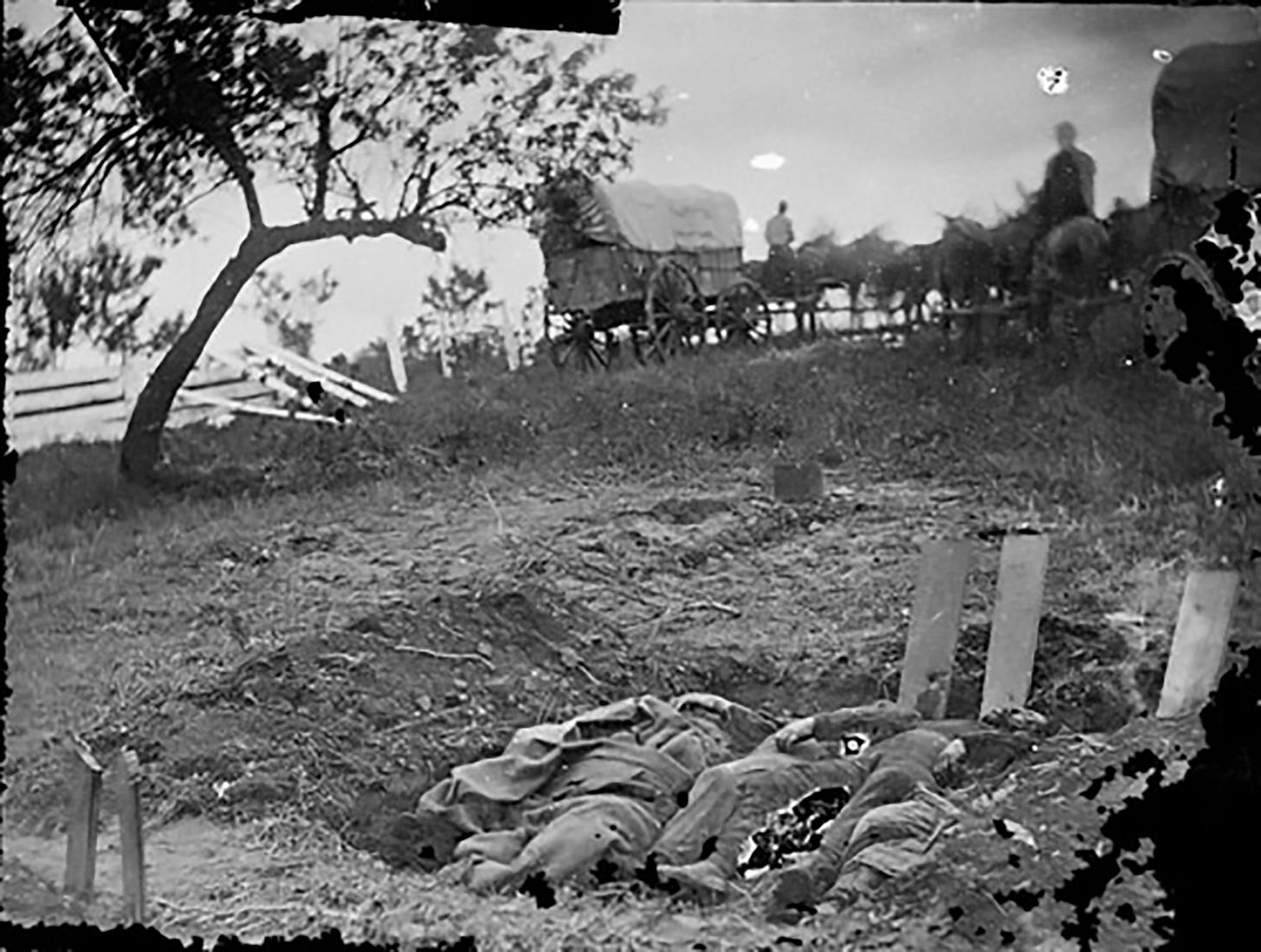The Civil War begins: Ambrose Bierce at Rich Mountain, 1861
After the Gold Rush, Chapter 37
The Civil War would ultimately bring two fledgling authors to California to make their literary fortune in San Francisco—via quite opposite paths. 25-year-old Samuel Clemens, later to be known as Mark Twain, fled to the West to avoid serving in the war. 19-year-old abolitionist Ambrose Bierce enlisted in the Union Army on the very day war was declared, and would later write of his horrific wartime experiences in his blistering short stories.
Those stories, based on his direct experiences as a Union officer during the Civil War, are some of the most brutal and heartbreaking pieces I’ve ever read. The agonies Bierce witnessed and endured fueled his later horror writing and his scathing critiques of society, on paper and in later direct activism against the egregious monopoly of the Southern Pacific Railroad. And he did it all with a terrible lifelong war injury: he lived his entire life after the war with a Confederate sniper’s bullet lodged in his head.
Meet this true American hero.
July 1861: Rich Mountain, Virginia
Ambrose Bierce
In the early morning of July 11, Brigadier General William S. Rosecrans, with almost 200 men, set out. The Federal column encountered enemy skirmishers on top of Rich Mountain. The surprised Confederate outpost at the pass took cover behind rocks and trees, and with the help of their one cannon, held off the Federal attack for over two hours. But badly outnumbered, they eventually gave way, and General Rosecrans' troops took possession of the field.
-The Indianapolis Journal
Nineteen-year-old Ambrose Bierce enlisted on the very day President Lincoln summoned the troops. His uncle, “The General,” who raised Bierce after he’d fled his troubled family when just a boy, was a committed abolitionist and early supporter of John Brown. Bierce told his uncle on the day he joined the Union Army: “Freedom is worth a few years of fighting.” And he meant it.
In training he’d quickly advanced through the ranks to Lieutenant.
Now, after his first major battle, he looked out at the field before him.
The evidences of the previous day’s struggle were present in profusion. The ground was tolerably level, the forest less dense, mostly clear of undergrowth, and occasionally opening out into small natural meadows. Here and there were small pools, mere discs of rainwater with a tinge of blood. Riven and torn with cannon-shot, the trunks of the trees protruded bunches of splinters like hands, the fingers above the wound interlacing with those below. Large branches had been lopped, and hung their green heads to the ground, or swung critically in their netting of vines, as in a hammock. Many had been cut clean off and their masses of foliage seriously impeded the progress of the troops. The bark of these trees, from the root upward to a height often or twenty feet, was so thickly pierced with bullets and grape that one could not have laid a hand on it without covering several punctures. None had escaped.
How the human body survives a storm like this must be explained by the fact that it is exposed to it but a few moments at a time, whereas these grand old trees had had no one to take their places, from the rising to the going down of the sun.
Angular bits of iron, concavo-convex, sticking in the sides of muddy depressions, showed where shells had exploded in their furrows. Knapsacks, canteens, haversacks distended with soaken and swollen biscuits, gaping to disgorge, blankets beaten into the soil by the rain, rifles with bent barrels or splintered stocks, waist-belts, hats and the omnipresent sardine-box—all the wretched debris of the battle still littered the spongy earth as far as one could see, in every direction. Dead horses were everywhere; a few disabled caissons, or limbers, reclining on one elbow, as it were; ammunition wagons standing disconsolate behind four or six sprawling mules.
Men? There were men enough; all dead, apparently, except one, who lay near where he had halted his platoon to await the slower movement of the line—a Federal sergeant, variously hurt, who had been a fine giant in his time. He lay face upward, taking in his breath in convulsive, rattling snorts, and blowing it out in sputters of froth which crawled creamily down his cheeks, piling itself alongside his neck and ears. A bullet had clipped a groove in his skull, above the temple; from this the brain protruded in bosses, dropping off in flakes and strings.
Bierce had not previously known one could get on, even in this unsatisfactory fashion, with so little brain.
One of Bierce’s men, whom he knew from a womanish fellow, asked if he should put his bayonet through him. Inexpressibly shocked by the cold-blooded proposal, Bierce told him he thought not; it was unusual, and too many were looking. 1
A few days later, in camp, someone handed Bierce a newspaper. He looked down on an article featuring his own name.
It is reported that Lieutenant Ambrose Bierce distinguished himself by coming to the aid of a fallen comrade. In open view of the enemy, Bierce carried the seriously wounded soldier to safety, with Rebel bullets falling around him like hail. Lieutenant Bierce has been promoted to sergeant major.
Bierce stared down at the newspaper.
He’d survived battle. He’d been commended for bravery and promoted. And he felt nothing. More, he knew now there was something mortally wrong with him.
He simply didn’t care if he lived or died.
And the war had just begun.
Read After the Gold Rush from the beginning:
Why subscribe?
After the Gold Rush is a reader-supported publication. To receive a monthly roundup of new posts and support this work, please consider becoming a free or paid subscriber.
Likes, Comments and Shares are extremely helpful and much appreciated!
From What I Saw of Shiloh, by Ambrose Bierce.



